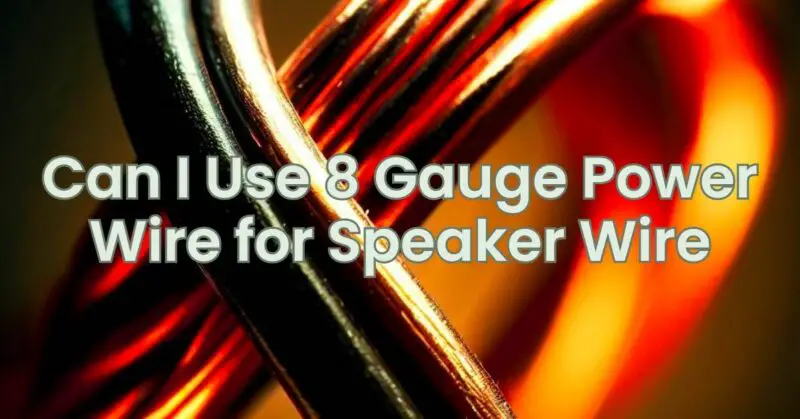Setting up a speaker system requires careful consideration of various components, including wires and cables. When it comes to connecting speakers, choosing the right wire is crucial for optimal audio performance. Some individuals may wonder if it’s possible to use an 8 gauge power wire as a substitute for a speaker wire. In this article, we will explore the feasibility of using an 8 gauge power wire for speakers and discuss the potential advantages and drawbacks.
Here is a table that shows the recommended gauge of speaker wire for different lengths and power levels:
| Length of speaker wire (feet) | The power rating of an amplifier (watts) | The recommended gauge of speaker wire |
|---|---|---|
| Less than 50 | Less than 100 | 14 gauge |
| 50 to 100 | 100 to 500 | 12 gauge |
| More than 100 | More than 500 | 10 gauge |
8 gauge power wire is typically used for high-current applications, such as car audio systems or power-hungry amplifiers. It is designed to carry significant amounts of power over longer distances while minimizing power loss and voltage drop. While it may seem like a viable option due to its thickness and ability to handle higher currents, there are important factors to consider before using it as a speaker wire.
One of the primary concerns when using an 8 gauge power wire for speakers is impedance matching. Speaker wire is usually designed with a specific impedance in mind, typically 4 or 8 ohms. Impedance is a measure of the opposition to the flow of electrical current in a circuit. Using wire that is too thick can potentially lower the overall impedance of the system, affecting the speaker’s performance and potentially damaging the amplifier.
Moreover, 8 gauge power wire is typically not designed with the same level of insulation or shielding as dedicated speaker wire. Speaker wire often includes insulation or shielding to minimize electromagnetic interference (EMI) and maintain the integrity of the audio signal. Without proper insulation and shielding, EMI can introduce unwanted noise and distortion into the audio signal, resulting in a degraded listening experience.
Another important consideration is the flexibility of the wire. Power wire, especially 8 gauge, tends to be thicker and less flexible than speaker wire. This lack of flexibility can make it more challenging to route the wire neatly and efficiently, especially when dealing with tight spaces or complex speaker setups. Speaker wire, on the other hand, is typically designed to be more flexible, allowing for easier installation and cable management.
It is also worth noting that using an 8 gauge power wire as a Can I use 8 gauge power wire for speaker wire speaker wire may not comply with local electrical codes or regulations. These codes exist to ensure safety and prevent potential fire hazards. Speaker wire is specifically manufactured to meet safety standards for in-home or commercial audio applications. Using power wires instead could compromise safety and insurance coverage, so it’s important to adhere to applicable regulations and use appropriate wires for their intended purposes.
In summary, while 8 gauge power wire may share some similarities with speaker wire in terms of thickness and power handling capabilities, it is not the recommended choice for connecting speakers. Impedance matching, lack of insulation and shielding, reduced flexibility, and potential safety concerns make dedicated speaker wire a more suitable option.
When selecting a speaker wire, consider the recommended gauge for your speaker system, the distance between speakers, and the power requirements of your audio setup. High-quality speaker wire with appropriate insulation, shielding, and impedance matching will ensure optimal audio performance and minimize the risk of equipment damage or safety hazards.
Investing in proper speaker wire specifically designed for connecting speakers is the best way to achieve the highest audio quality and maintain a safe and reliable system. By following manufacturer recommendations and adhering to local electrical codes, you can enjoy your speakers to their fullest potential while prioritizing safety and compliance.


